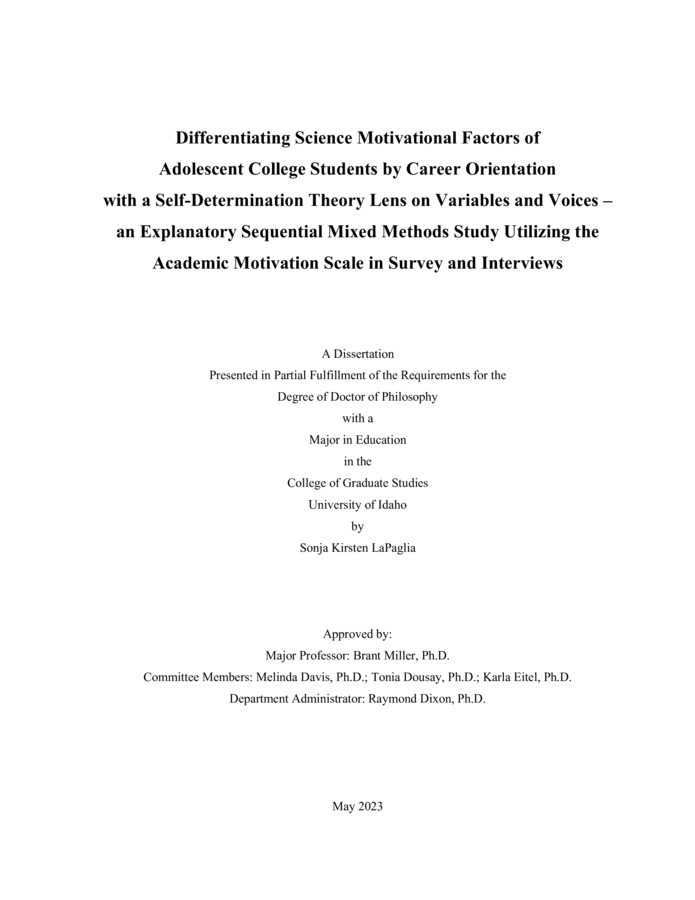Differentiating Science Motivational Factors of Adolescent College Students by Career Orientation with a Self-Determination Theory Lens on Variables and Voices – an Explanatory Sequential Mixed Methods Study Utilizing the Academic Motivation Scale in Survey and Interviews
LaPaglia, Sonja Kirsten. (2023-05). Differentiating Science Motivational Factors of Adolescent College Students by Career Orientation with a Self-Determination Theory Lens on Variables and Voices – an Explanatory Sequential Mixed Methods Study Utilizing the Academic Motivation Scale in Survey and Interviews. Theses and Dissertations Collection, University of Idaho Library Digital Collections. https://www.lib.uidaho.edu/digital/etd/items/lapaglia_idaho_0089e_12291.html
- Title:
- Differentiating Science Motivational Factors of Adolescent College Students by Career Orientation with a Self-Determination Theory Lens on Variables and Voices – an Explanatory Sequential Mixed Methods Study Utilizing the Academic Motivation Scale in Survey and Interviews
- Author:
- LaPaglia, Sonja Kirsten
- ORCID:
- 0009-0003-0335-0735
- Date:
- 2023-05
- Keywords:
- explanatory sequential mixed methods motivation science education Self-Determination Theory STEM careers undergraduate college
- Program:
- Education
- Subject Category:
- Science education
- Abstract:
-
This study investigated how undergraduate college students with different STEM career orientations differ in their motivation toward science education. The purpose of this study was to surface differences in the quality of motivations between groups of students with different orientations toward STEM careers to support them in science education classrooms better. A more in-depth understanding of motivational quality would allow science course instructors to design learning more specific to the types of student motivational profiles. Specifically, five motivational sub-dimensions of the Self-Determination Theory were investigated using the Academic Motivation Scale: amotivation, external, introjected, identified, and intrinsic motivation. This explanatory sequential mixed methods study investigated the the between-groups differences in each motivational sub-dimension quantitatively with a survey and qualitatively with interviews. The researcher conceptualized this study with a critical realist epistemology, applying self-determination theory as theoretical lens of the study. Results show significant differences in intrinsic motivation between all three STEM career orientation groups investigated, those interested in STEM careers, those interested in STEM-related careers, including technical careers and health professions, and those not interested in STEM careers. For all other motivational sub-dimensions, students not interested in STEM careers were significantly different in their motivation from the other two groups. Interviews surfaced the following theme trends for motivational qualities. Students oriented toward STEM careers discussed the challenges of pulling apart dense science concepts to learn as part of their cognitive process to become competent. In contrast, students oriented toward STEM-related careers tended to view the science courses as an externally imposed hurdle toward a career that required learning of knowledge comprised of facts, often not seen as relevant to their career. Overall, the narratives were in line with the empirical results. These outcomes constitute tools for science educators to assess students’ motivational profiles for science alongside authentic perspectives, allowing tangible insight into student views on education and their motivation to learn.
- Description:
- doctoral, Ph.D., Education -- University of Idaho - College of Graduate Studies, 2023-05
- Major Professor:
- Miller, Brant
- Committee:
- Eitel, Karla; Dousay, Tonia; Davis, Melinda; Dixon, Raymond
- Defense Date:
- 2023-05
- Identifier:
- LaPaglia_idaho_0089E_12291
- Type:
- Text
- Format Original:
- Format:
- application/pdf
- Rights:
- In Copyright - Educational Use Permitted. For more information, please contact University of Idaho Library Special Collections and Archives Department at libspec@uidaho.edu.
- Standardized Rights:
- http://rightsstatements.org/vocab/InC-EDU/1.0/

